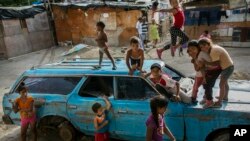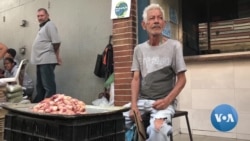ອົງການກອງທຶນເດັກຂອງສະຫະປະຊາຊາດກ່າວວ່າ ວິກິດການດ້ານເສດຖະກິດ ແລະການເມືອງໃນເວເນຊູເອລາ ກຳລັງມີຜົນກະທົບທີ່ຮ້າຍແຮງ ຕໍ່ເດັກນ້ອຍຫລາຍລ້ານຄົນ. Lisa Schlein, ນັກຂ່າວວີໂອເອ ມີລາຍງານຈາກນະຄອນເຈເນວາ (Geneva) ຊຶ່ງບົວສະຫວັນຈະນຳມາສະເໜີທ່ານໃນອັນດັບຕໍ່ໄປ.
ເວເນຊູເອລາເຄີຍເປັນປະເທດນຶ່ງທີ່ມີເສດຖະກິດຮັ່ງມີທີ່ສຸດຢູ່ໃນພາກພື້ນ, ໂດຍເຄີຍຖືເປັນຕົວແບບໃນຂະແໜງສາທາລະນະສຸກ ແລະການບໍລິການທີ່ຈຳເປັນດ້ານອື່ນໆໃຫ້ແກ່ປະຊາຊົນຂອງຕົນ. ມັນຍັງເຄີຍເປັນປະເທດນຶ່ງ ທີ່ເດັກນ້ອຍສາມາດມີຄວາມຈະເລີນເຕີບໂຕດີ. ສະພາບການອັນນັ້ນໄດ້ປ່ຽນແປງໄປຢ່າງຫລວງຫລາຍ.
ອົງການສະຫະປະຊາຊາດຄາດຄະເນວ່າ ນຶ່ງສ່ວນສາມຂອງເດັກນ້ອຍຈຳນວນ 10 ລ້ານຄົນ ໃນເວເນຊູເອລາ ແມ່ນຕ້ອງການ ການຊ່ວຍເຫລືອດ້ານມະນຸດສະທຳ. ອົງການດັ່ງກ່າວເວົ້າວ່າ ພວກເດັກນ້ອຍເຫລົ່ານັ້ນຂາດອາຫານທີ່ມີທາດບຳລຸງພື້ນຖານ, ຂາດການບໍລິການດ້ານສາທາລະນະສຸກ ແລະດ້ານການສຶກສາ.
ອົງການກອງທຶນເດັກຂອງສະຫະປະຊາຊາດ ຫລື UNICEF ເວົ້າວ່າ ຕົນຢ້ານວ່າ ການຂາດຄວາມສາມາດເຂົ້າເຖິງການບໍລິການທີ່ຈຳເປັນຂອງເດັກນ້ອຍ ກຳລັງເຮັດໃຫ້ພວກເຂົາ ມີຄວາມອ່ອນແອເພີ້ມຂຶ້ນ ແລະເຮັດໃຫ້ສຸຂະພາບ ແລະຄວາມເປັນຢູ່ຂອງພວກເຂົາ ຕົກຢູ່ໃນສະພາບທີ່ສ່ຽງຫລາຍຂຶ້ນ.
ໂຄສົກອົງການ UNICEF, ທ່ານ ຄຣິສຕົຟ ບູເລຍຣັກ (Christophe Boulierac) ເວົ້າວ່າ ຜົນກະທົບຂອງວິກິດການດ້ານເສດຖະກິດ ແລະດ້ານການເມືອງໃນເວເນຊູເອລາໂດຍລວມແລ້ວ ລ້ວນແຕ່ປາກົດໃຫ້ເຫັນຢ່າງຖ້ວມລົ້ນ.
ທ່ານກ່າວວ່າ ຕົວຢ່າງເຊັ່ນ, ອັດຕາການຕາຍຂອງເດັກນ້ອຍອາຍຸຕ່ຳກວ່າ 5 ປີ ເພີ້ມຂຶ້ນຫລາຍກວ່າສອງເທົ່າໃນລະຫວ່າງປີ 2014 ຫາ 2017.
ທ່ານ ບູເລຍຣັກ (Boulierac) ກ່າວດັ່ງນີ້:"ອັດຕາການຕາຍຂອງເດັກນ້ອຍອາຍຸຕ່ຳກວ່າ 5 ປີ ເພີ້ມຂຶ້ນຈາກ 14 ຄົນ ຕໍ່ ເດັກນ້ອຍ 1,000 ຄົນ ທີ່ເກີດມາ ຢູ່ໃນ 2010 ຫາ 2011 ມາເປັນ 31 ຄົນ ຕໍ່ເດັກນ້ອຍ 1,000 ທີ່ເກີດມາ ໃນປີ 2017."
ນອກຈາກນັ້ນ, ທ່ານຍັງເວົ້າວ່າ ມີການບັນທຶກໄວ້ວ່າ ມີເດັກນ້ອຍ 190 ລາຍ ສົງໄສວ່າເປັນໂຣກຄໍຕີບ ແລະ 558 ລາຍ ສົງໄສວ່າເປັນໂຣໄຂ້ໝາກແດງ ນັບແຕ່ຕົ້ນປີນີ້ເປັນຕົ້ນມາ.
ອົງການ UNICEF ຍັງເວົ້າອີກວ່າ ລະບົບສາທາລະນະສຸກຂອງເວເນຊູເອລາ ແມ່ນບໍ່ສາມາດປະຕິບັດງານໄດ້. ກອງທຶນດັ່ງກ່າວເວົ້າວ່າ ທ່ານໝໍແລະພະຍາບານຫລາຍຄົນ ໄດ້ໜີອອກຈາກປະເທດໄປ ຍ້ອນສະພາບທີ່ເຊື່ອມໂຊມລົງດັ່ງກ່າວ. ອົງການ UNICEF ກ່າວຕໍ່ໄປວ່າ ການສະໜອງຢຸກຢາ ແມ່ນຂາດເຂີນ ແລະສູນບໍລິການດ້ານສາທາລະນະສຸກສາມາດປະຕິບັດງານໃນລະດັບຕ່ຳຫຼາຍ.
ອົງການ UNICEF ໄດ້ເນັ້ນຢ້ຳວ່າ ສະພາບການແມ່ນຂີ້ຮ້າຍຫລາຍ ແລະໂຮງໝໍຕ່າງໆ ຂາດອຸປະກອນຫລາຍ ເຖິງຂະໜາດວ່າ ແມ່ຍິງທີ່ໄປເກີດລູກຈະຕ້ອງໄດ້ເອົາອຸປະກອນໃຊ້ໃນເວລາປະສູດໄປນຳ ໃນເວລາທີ່ພວກເຂົາເຈົ້າໄປເຂົ້າໂຮງໝໍເພື່ອເກີດລູກ.
ອົງການ UNICEF ເວົ້າວ່າ ຕົນກຳລັງເພີ້ມການຊ່ວຍເຫລືອດ້ານມະນຸດສະທຳໃຫ້ແກ່ເດັກນ້ອຍຢູ່ໃນເວເນຊູເອລາ. ນັບແຕ່ຕົ້ນປີນີ້ເປັນຕົ້ນມາ ກອງທຶນດັ່ງກ່າວໄດ້ສົ່ງວັດຖຸດ້ານສາທາລະນະສຸກ 55 ໂຕນໄປຊ່ວຍປະເທດນັ້ນ ແລະເຮັດໃຫ້ປະຊາຊົນຫລາຍພັນຄົນ ເຂົ້າເຖິງນ້ຳດື່ມທີ່ປອດໄພ ແລະການບໍລິການທີ່ສຳຄັນດ້ານອື່ນໄດ້.
ໃນຂະນະທີ່ຄວາມຕ້ອງການແມ່ນສູງທີ່ສຸດ, ອົງການດັ່ງກ່າວເວົ້າວ່າ ການປະຕິບັດງານດ້ານມະນຸດສະທຳຂອງຕົນ ບໍ່ສາມາດແກ້ໄຂບັນຫາໄດ້ພໍເທົ່າໃດ. ອົງການນັ້ນກ່າວມ້ວນທ້າຍວ່າ ເດັກນ້ອຍຫລາຍລ້ານຄົນຕ້ອງການການສັກຢາປ້ອງກັນພະຍາດ, ຕ້ອງການເຂົ້າໂຮງຮຽນ, ຕ້ອງການດື່ມນ້ຳທີ່ປອດໄພ ແລະໄດ້ຮັບການປົກປ້ອງ ແຕ່ວ່າໃນປັດຈຸບັນ ບໍ່ມີເງິນພຽງພໍທີ່ຈະໄປຊ່ວຍພວກເຂົາເຈົ້າໄດ້.
ເບິ່ງວີດິໂອທີ່ກ່ຽວຂ້ອງກັບເລື້ອງນີ້ ເປັນພາສາອັງກິດ
ອ່ານຂ່າວນີ້ເພີ້ມເປັນພາສາອັງກິດຢູ່ຂ້າງລຸ່ມນີ້
The U.N. children's fund says Venezuela's economic and political crisis is having a devastating impact on millions of children. Lisa Schlein reports for VOA from Geneva.
Venezuela used to be one of the richest economies in the region, considered a model in the provision of health care and other essential services for its citizens. It also was a country where children could thrive. That has changed dramatically.
The United Nations estimates one-third of Venezuela's population of 10 million children is in need of humanitarian assistance. It says they lack basic nutrition, health and education services.
The U.N. children's fund says it fears children's inability to access essential services is increasing their vulnerability and risking their health and well-being. UNICEF spokesman Christophe Boulierac says the impact of Venezuela's economic and political crisis is all too visible.
For example, he says the mortality rate for children under the age of five has more than doubled between 2014 and 2017.
BOULIERAC:
"Under-five mortality increased from 14 per 1,000 live births in 2010-2011 to 31 per 1,000 live births in 2017."
Additionally, he says 190 suspected cases of diphtheria and 558 suspected cases of measles have been recorded since the beginning of this year.
UNICEF says Venezuela's health system is broken. It says many doctors and nurses have left the country because of the deteriorating situation. It adds medicine is in short supply and medical centers are functioning at minimum capacity.
UNICEF underscores that conditions are so bad and hospitals so ill-equipped that women in labor need to bring their own midwifery supplies when they check into the hospital to have their babies.
UNICEF says it is scaling up humanitarian aid for children in Venezuela. Since the beginning of the year, it has sent 55 tons of health supplies, and provided access to safe drinking water and other essential services for hundreds of thousands of people.
While critically needed, the agency says its humanitarian operation is barely scratching the surface. It says millions of children need to be immunized, go to school, drink safe water and feel protected — though currently there is not enough money available to help them.






